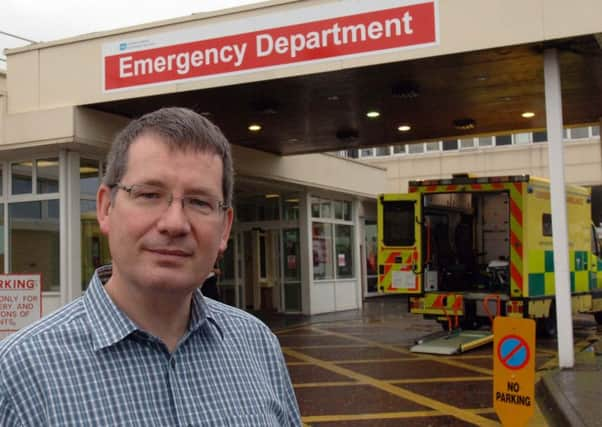Warning that lives at risk in Emergency Dept


That was the stark warning by the head of Emergency Medicine at Craigavon Hospital, Dr Seamus O’Reilly.
Dr O’Reilly, who is in charge of the local EDs in the Southern Health Trust, said that emergency care for patients with sudden and acute illness or severe trauma are being diverted by people who arrive with non-emergency conditions.
Advertisement
Hide AdAdvertisement
Hide AdAnd he added that people arriving at EDs with minor ailments are diverting staff away from the real job of saving lives.
He strenuously urged people to choose well before going to an Emergency Department.
“Saving lives is the priority for everyone working in ED and that minor ailments such as colds, sore throats and even paper cuts do not require treatment in an Emergency Department,” he said.
“The Emergency Department in Craigavon is currently experiencing a high level of pressure. Over the Christmas period there was a 10% increase in people attending.
Advertisement
Hide AdAdvertisement
Hide Ad“I think people sometimes forget that in any Emergency Department, there are people who are fighting for their lives and our staff are doing everything they can to help them. People involved in road traffic collisions, anyone with breathing difficulties, chest pains or a serious wound or limb injury all need to be our first priority.
“There is a significant number of people attending our Emergency Departments with minor conditions and they are diverting highly trained doctors and nurses away from the job of helping people who are real emergencies.
“Having queues of people with minor ailments distracts hospital staff from treating real emergencies. Limiting patients to urgent/emergency cases only would allow me and my colleagues to do what we are trained to do, without the distraction of queues of people with minor injuries and illnesses. It also allows patients with limb or life-threatening problems to receive the attention they need as promptly as possible.
“The whole process from the moment a patient arrives in the Emergency Department until they leave is very carefully managed and monitored by senior medical staff and they know exactly where each patient is at any given time.
Advertisement
Hide AdAdvertisement
Hide Ad“People who are assessed as having non-emergency conditions are likely to be treated in the Minors Area and will have to wait until patients with emergency conditions are given the emergency treatment they need.
“I make no apology for saying that patients in the Majors Area or Resuscitation area are the priority and that everybody else will just have to wait until care and treatment has been provided to these patients.
“The public has a really important role to play in helping ease the pressure on Emergency Departments and most people do understand when it is appropriate to go to an Emergency Department. However, hospital attendance in EDs in NI is high compared to the rest of the UK,” said Dr O’Reilly.
He reminded the public there are other services like Minor Injuries, GP, GP Out of Hours and pharmacies that can help. For further information go to: www.nidirect.gov.uk/choosewell